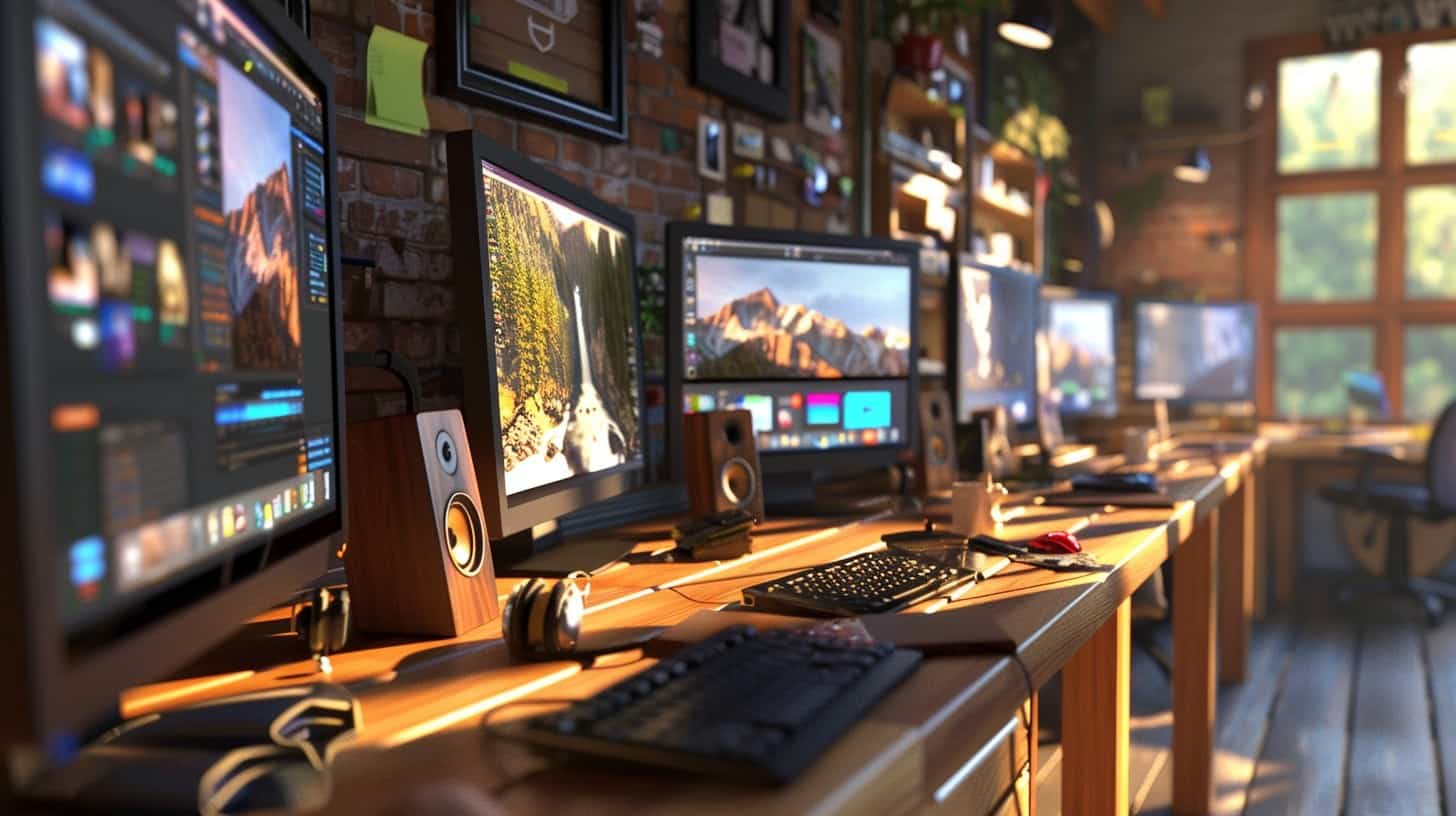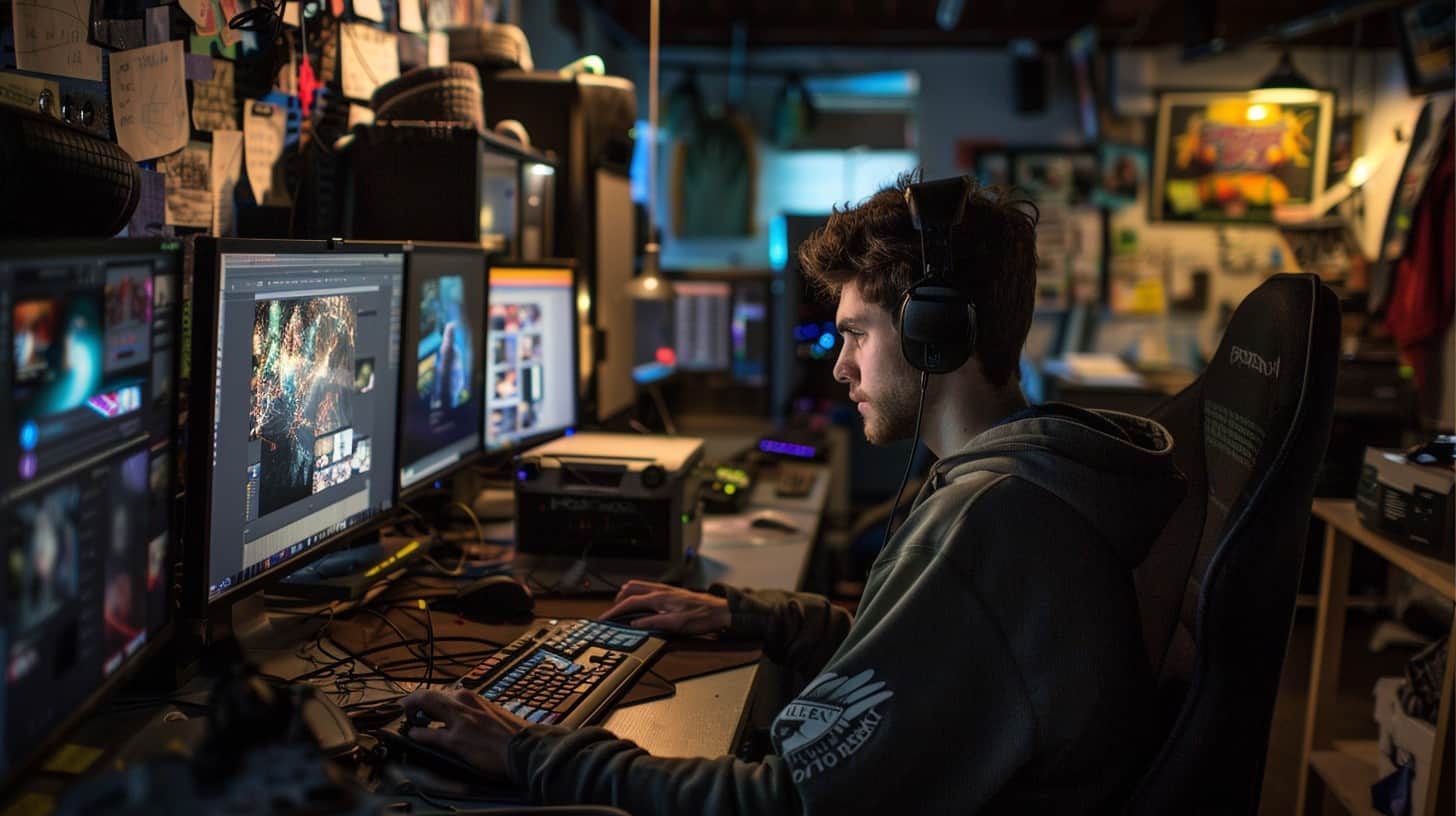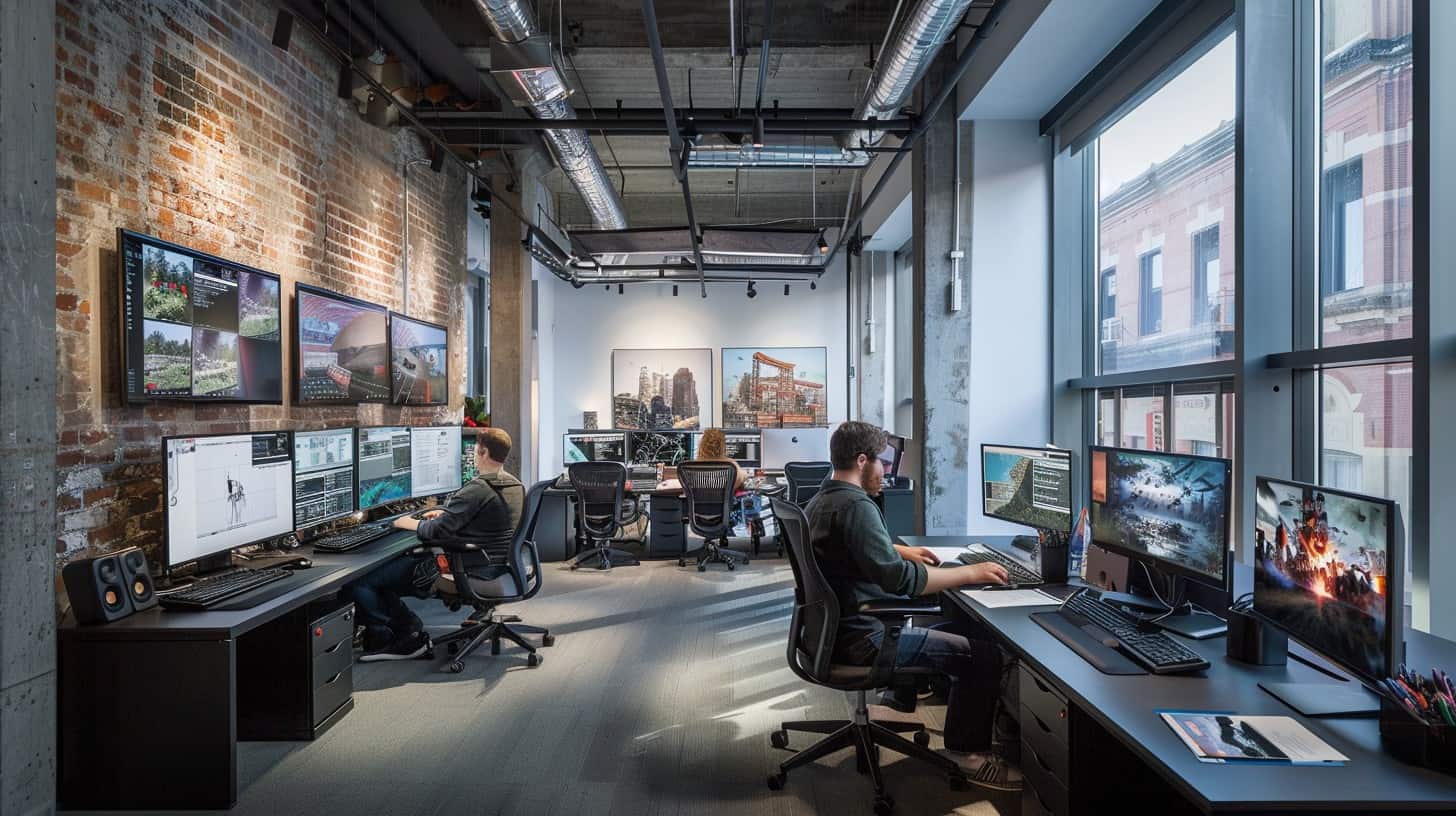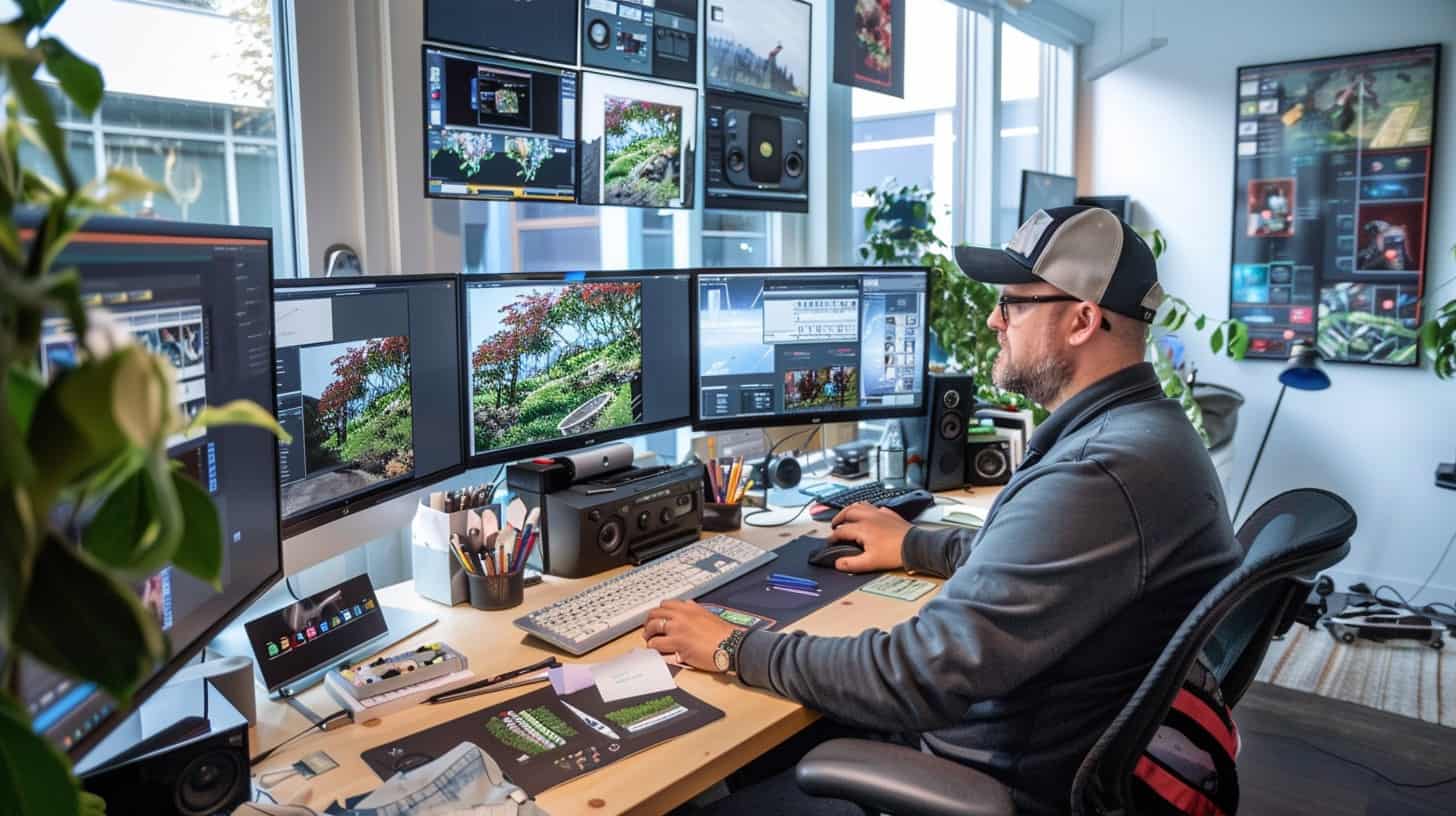Dreaming of creating the next big video game, but not quite sure where to start? Trust me, I understand that journey all too well. Delving into how to turn that dream into a reality, I discovered that an audience of nearly 2.8 billion gamers worldwide could be enjoying your creation.
This article is here to cut through the noise and lay out clear steps toward realizing your goal as a game developer. So, dive in with me—you won’t want to miss what’s ahead!
Key Takeaways
Game developers bring video games to life using coding, art, and sound. They need skills like programming in languages such as C++ and Java, game design, storytelling, and problem-solving.
Education is important for becoming a game developer. A bachelor’s degree in computer science or related fields can help. Learning through online courses and earning certifications are also good steps.
Specializing in areas like software development, game design, or sound engineering can shape your career path. Each role requires different skills, but working together as a team is crucial.
Keeping up with industry trends like virtual reality and cloud gaming helps stay ahead. These innovations change how games are played and developed.
Building a strong portfolio showcasing your projects is key to landing jobs in the game development field. Continuous learning and adapting to new technologies will keep your skills relevant.
Table of Contents
Understanding the Role of a Game Developer

Game developers bring video games to life, turning ideas into playable realities. They work magic with code, art, and sound—each piece vital for crafting the immersive worlds gamers adore. Companies like Relevant Software are among those that create magic behind the scenes through coding, enabling games to deliver unique experiences.
The Different Types of Game Developers
As a gamer, you might dream of making your own video games one day. The path to becoming a game developer is both exciting and challenging. Here, we’ll dive into the different types of game developers, giving you a clearer picture of who does what in the world of game creation.
- Software Programmers – They are the backbone, turning ideas into code that makes the game work. These wizards write and debug the code, ensuring that every part of the game functions seamlessly.
- Game Designers – These creatives shape how a game plays. They come up with the concepts, rules, and structures. Every level and mission springs from their imagination.
- Artists and Animators – They bring visual elements to life. Whether it’s designing characters or crafting immersive worlds, their artistry is vital for making games engaging and visually stunning.
- Sound Engineers – Essential for creating the auditory experience of a game. From sound effects to background music, they fill your gaming experience with audio that enhances gameplay.
- Quality Assurance Testers – The bug hunters. QA testers play through versions of games to find problems and glitches before players do.
- Game Writers – Storytellers who craft the narratives that drive many video games forward. Their work includes dialogues, plots, and character backstories.
- UI/UX Designers – Focused on how players interact with the game. They design menus, icons, and controls to be intuitive and user-friendly.
- Project Managers – Keep everything on track. They plan timelines, manage teams, and make sure everyone meets their deadlines.
- Localization Specialists – Ensure games resonate across different cultures by adapting content for various languages and regions.
Skills and Responsibilities
I understand how thrilling and challenging game development can be. It’s a field that demands a mix of creativity and technical prowess.
- Mastering programming languages is essential. Knowing C++, Java, and others lets you breathe life into your game ideas.
- Game design skills are a must. You’ll design levels, characters, and gameplay mechanics. Creativity meets logic here.
- Teamwork makes the dream work. Collaborating with artists, designers, and testers ensures a game comes together smoothly.
- Problem – solving keeps games fun and functional. You’ll tackle bugs and gameplay issues to enhance the player’s experience.
- Math and physics knowledge is crucial for realistic game environments. From gravity to momentum, your games need accurate simulations.
- Storytelling brings your game to life. Creating compelling narratives helps engage players on a deeper level.
- Familiarity with game engines like Unity or Unreal Engine speeds up development. These tools are vital for crafting interactive worlds.
- Testing rigorously ensures quality. Identifying and fixing bugs before release improves player satisfaction.
- Communication skills bridge gaps between technical and creative teams. Clear discussions keep projects moving forward effectively.
- Keeping up with industry trends keeps your skills sharp and relevant. Technologies like virtual reality or augmented reality could be your next playground.
Essential Skills for Game Developers

Becoming a game developer isn’t just about coding. It’s about understanding how to bring your team’s ideas to life, solve problems on the fly, and adapt to new challenges every day.
Communication
Good communication is a must in game development. I’ve learned it’s not just about coding or designing; it’s also about sharing ideas clearly with your team. Whether it’s through writing emails, presenting updates, or just chatting about a project, being able to express yourself well matters a lot.
Employers really value this skill. They know that great games come from teams who talk and listen effectively.
I make sure to practice my communication skills every chance I get. It helps me connect better with colleagues and makes working on projects smoother. In the competitive world of game development, standing out often means being someone others can easily work with—thanks to good communication.
This way, whether you’re discussing AI strategies or debating the best level design, you ensure everyone’s on the same page, pushing towards making those cozy gaming experiences we all love so much.
Teamwork
Creating a video game is like playing in a band; everyone has their part. I work closely with artists, programmers, and designers. We all share ideas to make our game the best it can be.
It’s about blending skills—technical and creative—to create something amazing.
My experience taught me that teamwork is key in game development. We rely on each other to solve problems and invent new ways to entertain players. This collaboration isn’t just helpful; it’s essential as we face tight deadlines and complex challenges together, making our shared vision come to life.
Problem Solving
Problem solving is like the superpower of game development. It’s key for fixing bugs, tackling programming puzzles, and making sure gameplay flows smoothly. I lean on my knowledge of programming languages and math to slice through these challenges.
Debugging becomes second nature; it’s all about finding the glitch in the matrix and smoothing it over.
I also build up my portfolio with examples of how I’ve solved tricky issues in games. This not only shows off my skills but proves to potential employers that I’m a problem solver at heart.
In a competitive job market, being able to point to real-world solutions makes a big difference. And let’s face it—there’s always going to be another bug to squash or puzzle to solve as long as there are games to develop.
Creativity
Creativity lights the path in game development. It’s not just about writing code; it’s imagining worlds, crafting stories, and designing puzzles that captivate gamers. I shape virtual realities where players lose themselves for hours.
My ideas turn into digital adventures — from sketching characters to plotting gameplay twists.
Every successful game starts with a spark of creativity. I dream up unique concepts and bring them to life through software design and storytelling strategies. This skill helps me stand out in a field where innovation wins.
Creativity isn’t optional; it’s essential to weave compelling narratives and create engaging gameplay that keeps players coming back for more.
Adaptability
In game development, things change fast. New technologies emerge, player preferences shift, and games evolve. As a developer, I’ve learned to be quick on my feet. Adaptability isn’t just a nice-to-have; it’s essential.
One day, you might be working on artificial intelligence (AI) for role-playing games, and the next you’re diving into augmented reality (AR). This field demands that I stay curious and ready to learn anything that comes my way.
Flexibility has saved my projects more times than I can count. Whether it’s adapting code for different operating systems or altering game design after feedback from testers—it all boils down to how well you can pivot your strategy without losing sight of the end goal.
The world of video games is dynamic; by embracing adaptability, I ensure my place in this exciting industry keeps evolving too.
Road Map to Becoming a Game Developer

Becoming a game developer isn’t just about playing video games—it’s a journey of hard work, creativity, and learning. Let’s dive into how you can start this thrilling adventure today.
Analyzing Video Games
Playing video games is more than just a great hobby for me; it’s a crucial part of my journey to becoming a game developer. I dive deep into each game, not just to have fun, but to understand what makes them tick.
I look at the graphics, storylines, and mechanics. Every level, character design, and user interface gives me insights into the creative and technical skills needed in game development.
I also pay attention to feedback from other players. What do they love or hate? This helps me see games from multiple perspectives, not just as a gamer but as a future developer. Learning from both successes and mistakes in existing games sharpens my skills and prepares me for creating my own interactive media experiences that could one day bring new worlds to life for players around the globe.
Pursuing Relevant Education and Certifications
I chose to get a bachelor’s degree in computer science. This step is crucial for anyone aiming to break into game development. Why? Because it teaches you the essentials of software engineering and computer games programming – two pillars of making awesome video games.
While studying, I focused on mastering programming languages like C++ and Java. These skills are what game studios look for.
Beyond my degree, I sought out certifications specific to video game design and development. Online classes helped me dive deeper into areas such as graphic design, database management with MySQL, and advanced game programming techniques.
Certifications provided a way to show potential employers that I’m not just passionate, but also well-equipped with the technical know-how necessary for developing AAA games or working in independent game development studios.
Learning Critical Computer Languages
After diving into education and certifications, knowing the right computer languages becomes my next big step. To create awesome games, I’ve got to learn languages like C++ and Java.
These are crucial because they’re the building blocks of most video game software. The choice of language often depends on the game engine I plan to use.
Getting comfortable with these coding languages opens up a world where creating everything from mods to full-blown independent games becomes possible. It’s not just about writing code; it’s learning how to think like a programmer.
This skill lets me bring any game idea to life, whether it’s an educational project or the next Fortnite sensation.
Developing Math and Physics skills
Mastering computer languages is just the start. Next up, getting a grip on math and physics is crucial. These subjects form the backbone of game development. Think about it—every leap, sprint, or puzzle in a game relies on these principles to feel real.
Employers often look for degrees in Mathematics and Physics. They know these skills are essential for crafting immersive worlds. So, if you’re aiming for a career in video game development, consider degree programs that strengthen your mathematical skills and understanding of physical laws.
This knowledge helps not only in creating believable environments, but also in solving complex problems during game design.
Mastering Storytelling Strategies
Game developers need storytelling skills to make video games come alive. Creating a game isn’t just about coding or designing levels—it’s about telling a story that players want to dive into.
I learned that the best games have memorable stories, ones that stick with gamers long after they’ve stopped playing. Developing these storytelling strategies involves understanding the framework of a good narrative, like building tension and developing characters players care about.
I also found out it’s important to consider non-linear storytelling. This lets players make choices that shape the game’s world and its outcome. By mastering both linear and non-linear narrative techniques, I can craft more engaging, immersive experiences for players.
It’s all about making them feel part of the story—not just observers, but actual participants in shaping how it unfolds.
Moving on, let’s talk about building a career in game development…
Building a Career in Game Development

I put together my game developer portfolio, showcasing all my projects. Then, I hit the job market, constantly looking for new opportunities where I can shine.
Creating a Game Developer Portfolio
A game developer portfolio is like a treasure chest, showcasing your best work. It’s crucial for catching the eye of potential employers and proving you’re not just another gamer turning their passion into a career dream.
Including projects where I’ve used C++ or Java shows off technical skills that are gold in this industry. A mix of personal and school projects, especially those demonstrating creativity and problem-solving, can outshine others.
Having a bachelor’s degree in computer science beefs up the portfolio even more. This academic background adds credibility and showcases a serious commitment to mastering the craft.
Next step? Hitting job boards and leveraging connections to find opportunities where I can contribute my skills as developers continue to shape the future of gaming.
Conducting Regular Job Searches
I make it a habit to search for game development jobs often. The gaming industry grows fast, and new opportunities pop up all the time. By keeping an eye on job boards, company websites, and networking within the gaming community, I stay ahead of others who might not be as diligent.
Networking is key. I talk to other developers, join online forums, and attend gaming conventions when possible. These actions open doors that a simple online application can’t. Also, platforms like Udacity and Udemy have been great for brushing up on skills that recruiters look for in game programmers and designers.
To me, every interaction could lead to my next big break in developing video games—a far cry from being just a waste of time or mere play.
Understanding the Job Market
The game development industry is booming, with nearly 2.8 billion gamers lighting up screens worldwide. This growth translates into a surge of opportunities for us developers. However, diving in requires more than just a passion for games; understanding the market’s dynamics is key.
A bachelor’s degree in computer science or software engineering gives us an edge, as does proficiency in languages like C++ and Java.
Opportunities vary across organizations— from indie studios to tech giants. While some roles demand deep knowledge of physics and math, others might focus on storytelling or game design.
Keeping abreast of trends and developing a versatile skill set can make all the difference. Crafting a standout portfolio showcases our skills to potential employers, setting the stage for a rewarding career ahead.
Next up: Considering specializations within game development..
Considering Specializations within Game Development
Game development is vast, with many roles to pick from. It’s not just about building games; it involves a mix of creative and technical work.
- Game Designer: Focuses on creating game mechanics and storylines. You’d need a strong vision and creativity. Understanding player psychology is key. Think about the kind of games you love—maybe you can design the next big hit.
- Software Developer: Writes the code that makes games work. Strong programming skills in languages like C++ or Java are a must. Remember, choosing a game engine is crucial here. Whether it’s Unity or CryEngine, each has its quirks.
- Art Director: Oversees all visual aspects of a game. From character design to the game environment, your job is to make the game look stunning. A keen eye for detail and artistic skill are essential.
- Sound Engineer: Creates sound effects and music score for games. If you have an ear for music and understand the impact of sound on gameplay, this could be your calling.
- Level Designer: Crafts individual levels or missions within a game, focusing on layout and how it plays into the overall experience. Balancing difficulty and fun requires creativity and a deep understanding of gaming mechanics.
- Quality Assurance Tester: Tests games for bugs before they go live. Attention to detail and patience are vital as you play through levels repeatedly to catch errors.
- Story Writer/Narrative Designer: Develops the plot, characters, dialogues, and world lore. Strong writing skills and storytelling ability are critical if you want to bring compelling stories to life in video games.
Insights into the Game Development Industry

Diving into game development opens up a world of innovation, where creativity meets tech—expect to discover trends that shape how we play and create games. Keep reading, and let’s explore this exciting journey together!
Salary Expectations for a Game Developer
Let’s talk numbers, specifically about what you can expect to earn as a game developer. Here’s a quick overview in table format to give you the essentials at a glance:
| Position | Country | Average Salary (Annual) |
|---|---|---|
| Game Developer | India | Rs. 5,00,000 |
| Game Designer | India | Similar to Game Developer |
| Video Game Programmer | India | Similar to Game Developer |
Here’s the deal, game development in India offers a promising start with an average annual salary of approximately Rs. 5,00,000. What’s interesting is, roles like game designers and video game programmers often see themselves in the same pay scale. This means, diving into any of these career paths holds a similar financial promise. It’s worth mentioning, these figures are just a starting point. With experience, specialization, and a portfolio that stands out, the sky’s the limit.
Current Trends in Game Development
I’ve noticed a big shift in game development towards virtual reality (VR) and cloud-based gaming. These technologies are changing how we play video games. Virtual reality offers gamers immersive experiences, making you feel like you’re really inside the game world.
With VR headsets, I can explore new worlds in a way that was once only dreamt of.
Cloud gaming is another trend on the rise. It lets me play high-quality games without needing expensive hardware. Games run on powerful servers in the cloud, streaming directly to my device.
This means I don’t have to worry about upgrading my console or PC to meet the latest game requirements – a huge plus for someone who just wants to enjoy gaming without the fuss.
Both trends show how technology is pushing boundaries, offering gamers like us more ways to dive into our favorite worlds. Whether it’s putting on a VR headset or playing through the cloud, these innovations keep making our gaming experiences better and more accessible.
FAQs About How to Become a Game Developer
What education do I need to become a game developer?
To kickstart your journey, aim for an undergraduate degree in computer science (comp-sci) or games design. These degree courses often blend theory with practice, covering everything from coding languages like MS SQL to understanding game lifecycles and geometry equations.
Can I learn game development online?
Yes, you can! With the rise of MOOCs (Massive Open Online Courses) and e-learning platforms, learners now have access to high-quality courses. This way, even without traditional classroom settings, you can gather essential knowledge on game development – from prototyping to gamification.
Do I need work experience in gaming before getting my first job?
Gaining work experience is crucial. Engage in internships at gaming companies or work as a game tester – these roles offer firsthand insight into the gaming industry’s workflow and help develop necessary skills for future projects.
How important are math and programming skills in game development?
Extremely important! Video game developers rely heavily on programming knowledge and mathematical concepts like equations and geometry for creating compelling gameplay mechanics and solving backend problems.
Are personal projects useful when becoming a video game designer?
Definitely! Creating independent games or engaging in modding communities showcases your creativity, problem-solving abilities, and technical prowess. It helps build a portfolio that impresses potential employers or collaborators.
Where can I find others interested in video game development?
Look towards online forums, social media groups dedicated to gaming, professional networks. Participating in discussions about games design, lifecycle management, cooperation strategies with suppliers could spark new ideas — not to mention the connections made could lead to potential partnerships.



